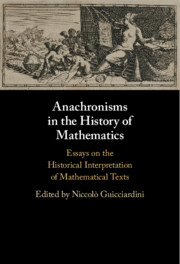 Anachronisms in the History of Mathematics
Anachronisms in the History of Mathematics Published online by Cambridge University Press: 19 July 2021
The differential equations as written by Leibniz and by his immediate followers look very similar to the ones in use nowadays. They are familiar to our students of mathematics and physics. Yet, in order to make them fully compatible with the conventions adopted in our textbooks, we have to change just a few symbols. Such “domesticating” renderings, however, generate a remarkable shift in meaning, making those very equations – when so reformulated – not acceptable for their early-modern authors. They would have considered our equations, as we write them, wrong and corrected them back, for they explicitly adopted tasks and criteria different from ours. In this chapter, focusing on a differential equation formulated by Johann Bernoulli in 1710,I evaluate the advantages and risks inherent in these anachronistic renderings.
To save this book to your Kindle, first ensure [email protected] is added to your Approved Personal Document E-mail List under your Personal Document Settings on the Manage Your Content and Devices page of your Amazon account. Then enter the ‘name’ part of your Kindle email address below. Find out more about saving to your Kindle.
Note you can select to save to either the @free.kindle.com or @kindle.com variations. ‘@free.kindle.com’ emails are free but can only be saved to your device when it is connected to wi-fi. ‘@kindle.com’ emails can be delivered even when you are not connected to wi-fi, but note that service fees apply.
Find out more about the Kindle Personal Document Service.
To save content items to your account, please confirm that you agree to abide by our usage policies. If this is the first time you use this feature, you will be asked to authorise Cambridge Core to connect with your account. Find out more about saving content to Dropbox.
To save content items to your account, please confirm that you agree to abide by our usage policies. If this is the first time you use this feature, you will be asked to authorise Cambridge Core to connect with your account. Find out more about saving content to Google Drive.